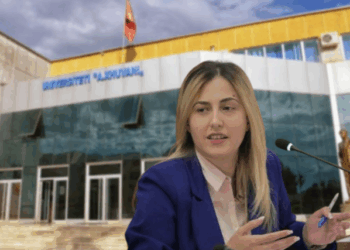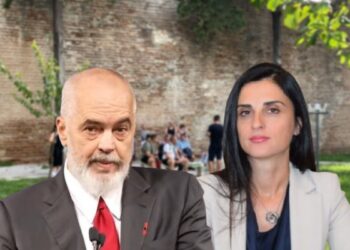A few days after the burial of 17-year-old Ardit Gjoklaj, his big brother returned to the Sharra landfill. With a tiny body and faded eyes, Ardiani, 19, asked the guard to let him go to the finance office of the company “3R”; the news of July’s salary distribution pushed him back to the tragedy.
At the finance office, Ardian put forward the payroll with the names of about 215 workers. He told BIRN that he found his brother’s name among them, filed a signature with his arm, and the employee left in his hand 23,000 leks of forty days of work that Arditi had carried out at the landfill before he was massacred to death among the rubbish.
Ardit Gjokla’s body was found massacred at the Sharri landfill on August 7 noon. According to family testimony, the 17-year-old was employed in the waste selection plant of “3R” sh.pk in Sharrë, in hopes of collecting the money needed to buy schoolbooks without burdening the family solely on the salary of the head of the household policeman.
After the event, four employees of the company “3R” were arrested and formally declared in search of administrator Edurim Teqja. According to police investigations, Ardit Gjoklaj was a seasonal worker, unregistered in company “3R” shpk and who remained dead as a result of an accident hit by an excavator, in the absence of working safety conditions.
Ardit Gjoklaj was neither the sole employee nor the sole unregistered and uninsured company “3R” ltd. BIRN learned that a large number of employees were recruited in black, working on a total lack of security conditions and unlike what was promised earlier by the mayor of Tirana, Erion Veliaj, were not equipped with either workbook or social security booklet.
Employees or former employees of the company “3R” shpk told BIRN in separate interviews that children, men and women – most of whom from the Roma community worked in inhumane conditions and in the absence of protective means between the rubbish.
Sharra Landfill is under the administration of the Municipality of Tirana. But in February 2016, the 3r company based in Peqin installed a waste disposal and waste management facility. In a previous investigation, BIRN discovered that this company was part of a larger gear that was being prepared by the Municipality of Tirana for waste management.
Before the tragic death of Ardit Gjoklaj, the plant of “3R” sh.pk in Sharr was visited twice by the Mayor of Tirana, Erion Veliaj. In the television chronicle of one of the landfill visits, broadcast on June 16, Veliaj launched his plan to ban the selection of waste from garbage bins and suggested to all those who provide mouthwash through this activity to be legally employed in the landfill and receive a salary with “social insurance”.
Velia’s invitation, according to the interviews conducted by BIRN, served as an incentive to increase the workforce at the plant installed in Sharrë by the company “3R” ltd. By contrast, none of the standards promised by Veliaj were applied during the work process.
Put under public pressure after the death of the 17-year-old, the Municipality of Tirana has refused to clarify its relationship with the company “3R” ltd. She has also ignored BIRN repetitive questions sent by e-mail or telephone messages.
At the Sharra landfill – where are the offices of company “3R” shpk, who refused to answer BIRN’s questions about Ardit Gjokli’s death and the lack of working conditions. After the death of the 17-year-old, the company has suspended work, while its administrator is still in search.
Avoiding responsibility
The Municipality of Tirana is not the only institution that has avoided the debate that followed the death of Ardit Gjoklajt. The technical staff of the company “3R” Ltd, detained by the police, also tried to avoid liability, stating that they did not recognize as a 17-year-old deceased employee at the landfill.
Data provided by BIRN indicate that Bujar Daja, company economist and Astrit Shehu, second-tier officials have told prosecutors that “they were unaware that Ardit Gjokli was a company employee”. In their testimonies, they have suggested that “his body might have been thrown out of a garbage truck at night.”
But their testimonies are dismissed by a 28-year-old worker, even the one of the latest Combinator who has seen alive Ardit on the night of August 6th. Zyrie Bilali, the mother of four, told BIRN that night was scolding, but landfill work continued at the same pace.
“The strides would spell out the date, while there was no light. About 3 o’clock in the morning we had a rest hour and Arditi asked for permission if I could eat bread in my truck, “Bilal recalls.
Afterwards, no one has seen alive Ardit.
The prosecution charges as author of the incident citizen Edmond Kallari, leader of the landfill fadrom. He is charged with the criminal offense of “Violating the Rules of Protection at Work”, provided by Article 289/2 of the Criminal Code, while the court has given the measure of imprisonment even for tour managers, Amusement Hakrama and Besnik Braha.
However, for Gjoklaj family in Kombinat Square in Tirana, justice has not yet been established. Fran Djoklaj, Ardit’s uncle, told BIRN that they had experienced as a murder for the second time statements suggesting that his grandson was not a Sharra landfill worker.
“Arditi went to look for job there. The Mayor announced that no one should gather up the trash, but go to the landfill and work there, with papers and everything else in order. Arditi died … and now declare that he did not work there, “he says in revolt.
While waiting and following the people who are still coming for comfort, Gjoklaj calls for ending efforts to hide this issue.
“I ask the Mayor, the Minister of Public Order, the People’s Advocate not to try to hide this issue, because it is outside any human norm. Non-acceptance is the second death for us, “Ardit’s uncle says.
“Ardit’s bicycles and clothes are still there,” he adds.
“Slavery” in Sharra
Illegal employment of Ardit Gjoklajt because of the age of juvenile does not surprise any of the employees of the landfill of Sharra that BIRN interviews. They show that the employment practice in company “3R” was driven by hunger for as much free labor as the respect of the laws in force.
Rajmond Kurdedja, 42, addressed the company in Sharra after the municipal police made it impossible to collect cans, bins or metal in the landfill or garbage bins in Tirana. He told BIRN he met Besnik Brahimi and was hired immediately, though he left work a month later.
“I went, I asked for a job, and immediately started the third round. They did not ask for any documents. They recorded the name and that, “Kurjedja told BIRN.
He points out that landfill work was organized in three tours, while he often found himself surrounded by child laborers. The easiest job, according to Kuringham was to dispose of the fertilizer in the conveyor, but the payment was lower.
He himself chose to work on “shovels” (so workers call the work process near the fadrom that collects garbage) for 1 thousand Lek night.
Like the other employees, Kurdedja complains about the safety conditions at work or the lack of most elementary equipment. There was no gloves or protective measures for the respiratory system.
“I began to have health problems from smelling and hard work. I could not cope. In the crevices where the garbage was opened to breathe. I had a lot of headaches. You were forced to stand for 8 hours on foot, to share the cardboard, plastmas, metal, and a second to see you relaxed, shouting, “says Kurdedja.
“Only for this you may end up getting fired,” he adds.
Similar testimony to the almost inhumane conditions of work was given to BIRN by other landfill workers. Gentian Zenollari, another employee, showed that handgrip incidents or other broken bottlenecks or syringes were a normal work of their own.
“No one was responsible, and in many cases we did not show that we risk working,” says Zenollari.
Employees say once that they had no information if the company had provided them, and even had not heard that the Labor Code obliged him to implement a set of rules for the benefit of employees.
“Every 8th of the month, we were faced with the finance office and received the salary. The woman who was there asked us for the name, checked in the list and gave us the money, “Rajmond Kurdedja told BIRN.














